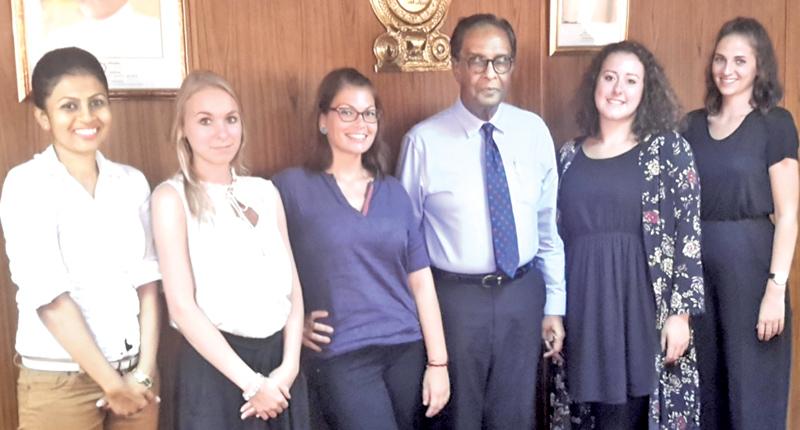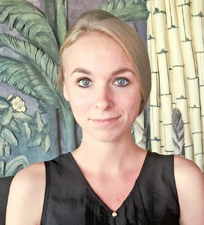
This article is about the friendly cooperation between the organization Asian German Sports Program (A.G.S.E.P.) and the Sri Lankan Ministry of Prison Reforms, which is to be expanded further through the support of German female social workers as part of the project, ‘Women for Women in Jail’.
The Department of Prisons in Colombo, pursues the vision of the successful rehabilitation and social reintegration of inmates to become valuable members of the community again. The key goals include the creation of a more civilized society, better qualified and higher motivated prison officers and the improvement of industrial and agricultural activities to ensure at least 50 % of the daily needs of prison inmates.
 Nastasja Berwing, intern of A.G.S.E.P. (Catholic University of Applied Sciences, Germany, Aachen) |
The core mission aims at establishing a better relationship between prison officers and inmates to achieve the main objectives of custody, care and corrections and thereby assure a higher job satisfaction of the officers. It aims at increasing positive attitudes among officers and to regulate the welfare of the prisoners. Hence, the Women for Women in Jail project would be pleased to advance the process in close cooperation with the Ministry of Prison Reforms.
As already mentioned in a personal discussion with the Minister of Prison Reforms, D. M. Swaminathan the social work students would like to take on the task of supporting female prison inmates and their children to acquire both, English and German language skills.
As already mentioned, A.G.S.E.P. in close cooperation with the Ministry of Prisons Reforms, has no intention of carrying out journalistic work in the sense of a negative assessment of the Sri Lankan prison.
On the contrary, A.G.S.E.P. as an independent organization, based in Marawila since 1989, and whose founder and Chief Executive Officer has been living in Sri Lanka for 30 years, is eager to contribute to a positive socioeconomic and cultural development of the country. We are able to support the implementation of the objectives, especially, with regard to the aim of the Ministry, to realize the development of a better civilized society. By supporting qualified inmates to acquire English and German language skills, the opportunity for employment of these women would be increased. International language skills are particularly important to enhance professional job opportunities for women, who, by virtue of their status as formerly delinquent, automatically face extreme difficulty in finding decent jobs. By acquiring international languages, these women are, for example, given the opportunity to work in the tourist industry (e.g. as tourist guides, hotel receptionist).
It is also a special concern for us to support the children who live with their mothers in prison, because, although they are by no means responsible for their mother’s convictions, they often end up being affected by the legal consequences. Although the mother-child bond is strengthened by the fact that the children are imprisoned with their mothers, the children miss out on essential parts of normal life, outside prison. These aspects may include, diverse everyday situations (road traffic, crowds, etc.) male reference persons, child-friendly environments, relation to nature, lack of social contacts and many more.
The room in which the children can move is too small. Moreover, developmental psychologists suggest a particular difficulty when children grow older (from 3-4 years): they then begin to perceive imprisonment as a restriction and perceive the external control over their mother through different eyes. Both, the Ministry of Prison Reforms as well as A.G.S.E.P. agree that living conditions in prisons are not suitable for the mental and physical development of the children in prison. Therefore, A.G.S.E.P. strongly promotes the delivery of child-friendly activities, including games and afternoon classes, and language courses. These activities resemble adequate structures for schoolchildren, which can prepare them for attending regular schools after prison. Furthermore, our qualified female students will closely monitor and promote the socio-emotional development through special educational offers, which will provide a smooth transition to the reintegration of the children into society.
